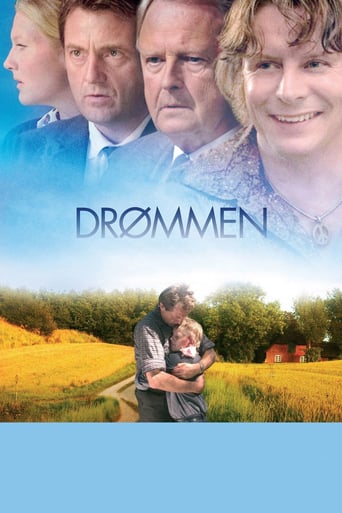



Plot so thin, it passes unnoticed.
It is interesting even when nothing much happens, which is for most of its 3-hour running time. Read full review
View MoreThis movie feels like it was made purely to piss off people who want good shows
View MoreBlistering performances.
The script seemed to have been written by a young child, say twelve years old. None of it was believable. It was trying to be a David v Goliath story about a brave kid defying the power of his brutal headmaster and the conspiracy of lies of the school board, but succeeded only in lurching from one preposterous scene to another. SPOILERS! Let me give some examples of its nonsense. The Nazi-type headmaster beats the kid up , practically tearing his ear off. His so loving mother is afraid to complain for fear she may lose her job as school nurse. When she doesn't leave it alone she is sacked by the school doctor (see what I mean by conspiracy). The chairman of the governors tells the headmaster to lie and say he never touched the boy. The chairman's young daughter tells the true story to her parents but is ignored. The vicar is also against the family. The police say it is not their concern!!! even though Danish law at that time outlawed corporal punishment.The school secretary is made 'unavailable' on the day of the hearing (she could have given evidence for the boy). The hippy teacher, up till then a great supporter of the boy, lies because he is afraid of losing his job. The boy's father is left with no witnesses. Then -- believe it or not -- the head has the confidential medical records of the boy's father in his possession and reads them out to the tribunal -- which apparently destroys the father, and the next we know he is back in the mental institution. Having lied just to save his job, the hippy teacher immediately resigns (no, really).MORE SPOILERS The boy repeatedly tells the headmaster in class that he is a liar. With each accusation the head beats him up again in front of his classmates, thus giving himself a fatal heart attack. When the children hear that he is dead, they shout and jump about all over the place whooping with joy. In short, the actions of the characters are inconsistent and unbelievable. It is all very well to wear your heart on your sleeve, but that does not excuse this nonsense of a film!
View MoreThe Danish film We Shall Overcome succeeded in pleasantly surprising me. Of course I was aware that it targets young children, albeit with a serious humanist overtone. However, the film delves deeper in the psychology of social relations than I expected, and will also keep adults pinned to their cinema seats. The theme, the life of a farmers boy Frits in a country village, seems worn out, and immediately reminded me of the classic Dutch films (including remakes) like "Merijntje Gijzen" or, in an urban environment, "Kees de Jongen" and "Ciske de Rat". Usually such films elaborate on the problems and threats, that face the average adolescent boy. Invariably, on the surface his family life appears happy, but drama requires that the happiness is feeble and that the parents are somewhat clumsy people. We Shall Overcome is in keeping with this stereotype, for the father finds himself in a midlife crisis, including severe depressions. At first the mother appears to be active, but she is actually bossy, and she finds fault with her spouse in a vicious way. The story hinges on the head master of the local school, called the General, who indulges in physically violent behavior (still a fairly common phenomenon in those days, the late sixties). This man drags Frits by the ear, and due to its build nearly tears it off, in such a way that It has to be sutured. We immediately recognize the situation and the ensuing dilemma, for what has to be done? What is wisdom? In the traditional film on adolescence the authority of the head master would have remained unchallenged, but remember: here the civil rights movement is at its peak. An additional complication is the class teacher of Frits, who serves his apprenticeship and adheres to New Left politics. His aim is the long march through the institutions in order to take power. On the positive side is the brightness of Frits, who has an astonishing admiration of Martin Luther King. Now watch this: the parents decide to file a formal complaint with the school board! Although they indeed have a vague notion about the social fate of "bell-ringers", they harbor the naive belief that this injustice will certainly be condemned. However, the General belongs to the local notabilities and has already been able to hush up his earlier misconducts. This places you as the observer on the edge of your seat: what will happen to this borderline family, if the General will win the dispute? Although the circumstances appear trivial, the suspense gets a nearly violent tasting. The General develops a brutal and almost fascist attitude, whereas the family slowly slides into an existential (!) despair. Eventually the chairman of the school board advises the General to deny the allegation. At the hearing two witnesses are summoned: the Generals secretary, who doesn't show up, and the apprentice teacher. The unravelling reaches a climax when the teacher pretends to have seen nothing, which is clearly a lie. The family is in shock, in particular the father, who must be admitted to a mental hospital. On reflection, the choice of the teacher is understandable: if you plan a march through the institutions, you should not become a "bell-ringer". Political engagement is different from individual engagement (and perhaps even the opposite). The true climax occurs in the classroom, where Frits keeps calling the General a liar, and thus drives him into a deadly stroke. When the school board organizes a memorial gathering, the whole group of pupils spontanously break out in cheerings of joy - like the TV pictures that we know after the toppling of a dictator. It is a brilliant albeit somewhat far-fetched scene. The final scene, which shows Frits trying to persuade his father to come home, has an open ending. I love this film. The dilemma of the family is fascinating, and they should probably have fared better with covert resistance. In fact if the Frits character would have been a grown-up, the theme would have been perfectly fitting for adults. I wonder if this film could have been made outside the Scandinavian countries.
View MoreInsisting that Martin Luther King's inspirational spirit resides not just in American civil liberties but inside the hearts and minds of people everywhere, Danish helmer Niels Arden Oplev transplants this belief to a 1969 Danish middle school. More specifically, it works its way into the crusade of a young boy named Frits (Janus Dissing Rathke) against his oppressively rigid and churlishly abusive headmaster Svendsen (Bent Mejding). Adapted from a true story, the performances are executed with certain aplomb and a refreshing command over its varied characters keeps it involving. A battle of ideologies between a 13 year-old and a demented disciplinarian gives way to inherent humour but awkward shifts in mood disorients despite keeping it shrewdly cynical in the same vein as a "Dead Poets Society" more than a "Matilda". It treads a familiar path but a continued and precise service to its young protagonist including a personal subplot that rounds off Frits as a young boy becoming a young man, manages to raise the film into a rousing family film with its nose right on the money.
View MoreA kid with ideals who tries to change things around him. A boy who is forced to become a man, because of the system. A system who hides the truth, and who is violating the rights of existence. A boy who, inspired by Martin Luther King, stands up, and tells the truth. A family who is falling apart, and fighting against it. A movie you can't hide from. You see things, and you hear things, and you feel things, that you till the day you die will hope have never happened for real. Violence, frustration, abuse of power, parents who can't do anything, and a boy with, I am sorry, balls, a boy who will not accept things, who will not let anything happen to him, a kid with power, and a kid who acts like a pro, like he has never done anything else, he caries this movie to the end, and anyone who wants to see how abuse found place back in the 60'ies.
View More